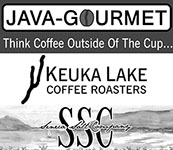The Leader
August 1, 2008
New gourmet coffee business tied to Keuka Lake Wine Trail
BY DERRICK EK. Photo by Jason Cox
dek@the-leader.com
In a lot of ways, the coffee business resembles the winemaking industry.
Coffee beans, like grapes, come in many varieties of differing quality. Both coffee and wine are influenced greatly by production methods. And the finished products have a multitude of flavor components, and are targeted to a wide range of consumers.
"There are people that are thrilled with a $3 bottle of wine, and couldn't tell the difference between that and a $50 bottle of Merlot," said Brian Friguliette, co-owner of Keuka Lake Coffee Roasters, a new gourmet coffee business. "And there are people that get used to the large institutional coffees, like Maxwell House and Folgers."
Those big-time supermarket brands use a blend of high-quality Arabica beans and Robusto beans, which have a higher caffeine content but are generally considered to be inferior in flavor. Friguliette uses only Arabica beans.
"There are a lot of people out there now that are developing better tastes," Friguliette said. "It's the first cup of coffee they drink in the morning, and they might only have one cup or maybe two cups a day. They want to drink something with some quality and taste to it."
Not coincidentally, Keuka Lake Coffee Roasters is already intertwined with the local wine industry, which has boomed in recent years. The type of person that wanders the Finger Lakes sampling fine wines is often the same type of person who enjoys a gourmet flavored coffee, said Susan Atkisson, Friguliette's significant other and business partner.
That's why their coffees are now sold in bags - or served fresh - in many wineries, restaurants, inns and bed-and-breakfasts around Keuka Lake.
Friguliette and Atkisson aren't proprietors of a storefront coffee shop. Instead they operate a commercial small-batch roaster and a small office out of a red barn on their property, which overlooks the top of Keuka's western branch. They roast, flavor and package the coffee themselves.
They rely on a developing network of existing retail locations - wineries such as Glenora, Fox Run, Wagner Valley, Heron Hill; restaurants like Hammondsport's Village Tavern; and other miscellaneous places such as orchards and small markets.
Atkisson grew up in southern California, and was an elementary school teacher for 20 years. She has family in Corning, Hammondsport and Campbell - including her grandmother, Dorotha Bergh, of Corning, who recently turned 100 years old. Atkisson would often vacation on Keuka Lake while visiting her relatives here, and loved the area.
Seven years ago, she moved to Boston, where she met Friguliette, a former microbrewery owner who was working for a large coffee company, where he was in charge of importing coffee beans, and managing the roasting operation. After a "whirlwind romance based on coffee," as Atkisson puts it, the couple decided to buy a home on Keuka Lake. They launched their business about a year ago.
Atkisson had always wanted to run her own business, and Friguliette was able to use his contacts with brokers to import small quantities of high-end coffee beans from Ethiopia, Kenya, Nicaragua, Columbia, Brazil, Guatemala and Mexico (coffee only grows south of the equator, and the only state in the U.S. with coffee farms is Hawaii).
Friguliette enjoys the total control he has over the roasting process. Roasting only small batches has many advantages.
For example, the roasted beans can be air-cooled, allowing them to retain their oils, which contain a lot of the flavor. Large-scale commercial operations are forced to spray the batches with water to cool them and prevent them from burning, which washes away the oils.
Also, when making blends, Friguliette roasts the different types of beans separately, then mixes them together afterward. That's important because the beans require different roasting times and temperatures. Large-scale operations roast everything together when producing a blend, meaning certain beans are either overcooked or undercooked.
"I've gone from equipment that's two or three times the size of a car, and roasting 500 or 600 pounds of coffee at a time, to roasting about 10 pounds at a time," he said.
Each batch takes about 15 minutes, and the beans change from a greenish color to a dark brown, expanding to three times their original size.
Atkisson does a lot of the flavoring and packaging. Aside from its traditional roasts, Keuka Lake Coffee Roasters does specialty flavors such as the Harvest Spice Blend, with maple and cinnamon, the Scandinavian Winter Blend, with almond and ginger and the Italian Chocolate Raspberry. The whole lineup is listed on their Web site, www.keukalakecoffeeroasters.com.
"We use a little flavoring, so you get nice aromas," Atkisson said. "There's a subtle taste, but it's not overpowering. You're still tasting the coffee."

